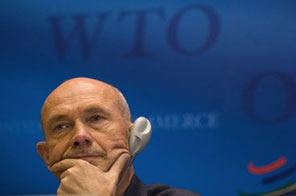World trade to grow 9.5% in 2010: WTO chief
GENEVA : World trade is expected to grow 9.5 percent in 2010, after suffering its biggest collapse since World War II in 2009, the head of the World Trade Organisation Pascal Lamy said on Friday.
"Our economists are forecasting a world trade growth for 2010 of 9.5 percent with developing countries' trade growing 11 percent and industrialised countries' trade growing by 7.5 percent," the WTO director-general said.
"This means that trade-wise, there is light at the end of the tunnel and it's certainly a good forecast, good news for the world economy," he added.
World trade plunged 12 percent in 2009 due to a "sharp contraction in global demand" during the economic crisis.
Amid last year's slump, China overtook Germany to become the world's top exporter with some 1.20 trillion dollars worth of merchandise exported in 2009, according to WTO data.
Germany exported 1.12 trillion dollars of merchandise, while the world's biggest importer, the United States, was in third place with 1.06 trillion dollars worth of exports last year.
The WTO noted that the trade slump last year was particularly magnified by the "product composition of the fall in demand, by the presence of global supply chains, and by the fact that the decline in trade was synchronized across countries and regions."
Underlining the scale of the downturn, Patrick Low, chief economist at the WTO, said that the projected growth of 9.5 percent this year would need to be repeated in 2011 in order for the global economy to recover to peak trade levels reached in 2008 before the crisis struck.
"If you need to do it in one year, you'll need 14 percent," he added.
The economist warned that the 2010 forecast could yet prove over-optimistic if currency and commodity prices were to show wild swings, or if the financial markets were to show other adverse developments.
On the other hand, "if unemployment were to be reduced faster than is predicted then that would have a good effect on trade growth rates," added Low.
But while trade prospects appear healthy this year, prospects on the so-called Doha Round of negotiations for a global trade deal were more gloomy.
"The outcome is that we are not where we wanted to be," said Lamy, after a week of meetings of the 153 WTO member states on ways to reach a deal on the long-running negotiations.
"Yes, we made some limited progress since (2008) but obviously not enough to enter into the final game which will take some time," Lamy added.
The WTO chief also distanced himself from the 2010 target set by the Group of 20 developed and developing leaders for the conclusion of the Doha talks.
"The technical reality is that given what's on the table, it's technically feasible, but it wasn't a technical orientation. It was a political orientation," Lamy said.
"I did not declare this political orientation. The answer to your question lies with the leaders, not with me," the WTO director-general said in response to a question on whether an accord was still possible by year-end.
The Doha talks began in 2001 with a focus on dismantling obstacles to trade for poor nations. However, it has been dogged by intractable disagreements.
These include how much the United States and the European Union should reduce farm aid and the extent to which developing countries such as India and China should lower tariffs on industrial products.
Successive deadlines to conclude the talks have been repeatedly missed.






